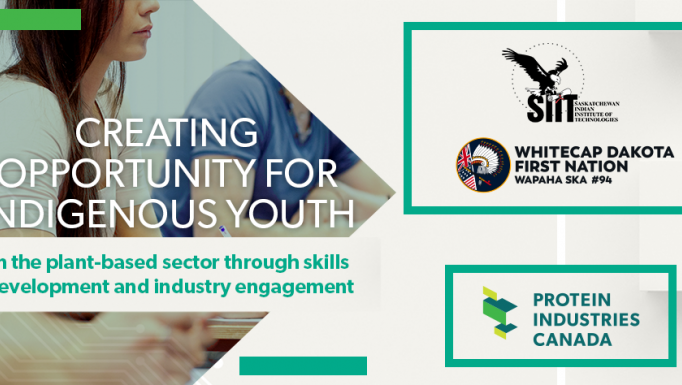Economic Reconciliation
We are committed to promoting Indigenous inclusion and uplifting Indigenous voices in Canada’s agrifood sector.
By working with Indigenous partners in the agrifood sector, Protein Industries Canada affirms its commitment and responsibility in improving the relationships between Indigenous peoples, and our understanding of their culture and the unceded land of the First Nations, Inuit and Métis in which we call home and from which we source ingredients.
Indigenous Land Acknowledgement
Protein Industries Canada acknowledges that our head office, located in Regina, Sask., is on Treaty 4 territory, the original lands of the Cree, Ojibwe, Saulteaux, Dakota, Nakota and Lakota, and the homeland of the Métis Nation.
Further, we respect and affirm the inherent and Treaty Rights of all Indigenous Peoples across this land. Protein Industries Canada has and will continue to honour the commitments to self-determination and sovereignty we have made to Indigenous Nations and Peoples.
Protein Industries Canada's role in economic reconciliation
Economic reconciliation is the process of addressing the economic disparities and injustices experienced by Indigenous Peoples. In alignment with the Federal Government of Canada, Protein Industries Canada recognizes that Indigenous self-government and laws are critical to Canada’s future and that Indigenous perspectives and rights must be incorporated in all aspects of this relationship. The implementation of the United Nations Declaration on the Rights of Indigenous Peoples requires transformative change in industry’s relationship with Indigenous Peoples. The UN Declaration is a statement of the collective and individual rights that are necessary for the survival, dignity and well-being of Indigenous Peoples around the world, and, within the scope of the organization’s mandate, Protein Industries Canada will take an active role in enabling these rights to be exercised. Protein Industries Canada will fulfil its commitment to implementing the UN Declaration through collaborative initiatives and actions. This approach aligns with the UN Declaration itself.
As part of Protein Industries Canada’s role in striving for economic reconciliation, we will require all Fund II projects to incorporate an aspect of economic reconciliation. As there are many differences between projects and organizations, the approach to economic reconciliation will also differ between projects and organizations. We will work cooperatively with federal, provincial, local and other Indigenous governments to achieve meaningful outcomes from these undertakings. We recognize that differences may from time to time arise and will support and adhere to conflict resolution processes that Indigenous parties may establish for the purposes of resolving differences in good faith.
Some potential approaches can include, but are not limited to:
- Engaging with Indigenous communities and organizations to understand their priorities and needs related to economic reconciliation. This may involve consulting with Indigenous leaders, business owners and other stakeholders to gather input and ideas;
- Identifying specific areas where economic reconciliation can be addressed in the proposal. This may include investments in Indigenous-led businesses, support for Indigenous entrepreneurship or efforts to address the ongoing impacts of colonization on Indigenous economic development;
- Developing strategies and action plans to address the identified priorities and needs. This may involve creating partnerships with Indigenous organizations, identifying funding sources, and developing measurable goals and targets for success;
- Completing organizational training on Indigenous engagement and reconciliation;
- Implementing the strategies and action plans, with ongoing consultation and collaboration with Indigenous communities to ensure that the efforts are effective and aligned with their priorities; and/or
- Monitoring and evaluating the progress of the economic reconciliation efforts and adjusting as needed to ensure that they are successful and sustainable over the long term.
Indigenous resources
To learn more about economic reconciliation and how your company can create meaningful partnerships with Indigenous communities, please visit:
- First Nations University of Canada
- Reconciliation Canada
- Circles for Reconciliation
- Indigenous Corporate Training Inc.
- The National Indigenous Economic Development Board
- Reconciliation Education
- Indigenous Education: The National Centre for Collaboration
- Canadian Council of Aboriginal Business
- National Aboriginal Capital Corporations Association
- SOAR Professional Services
- OneHoop



